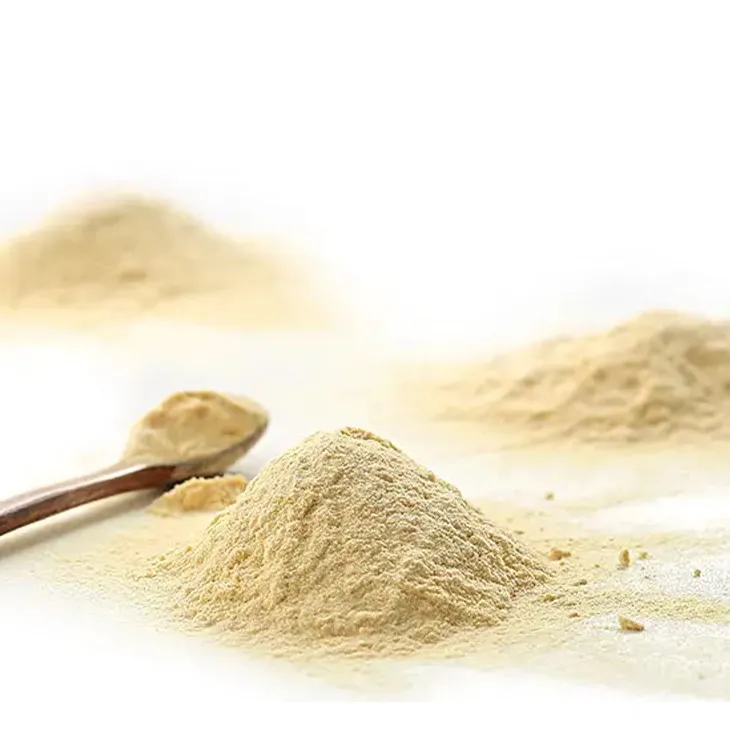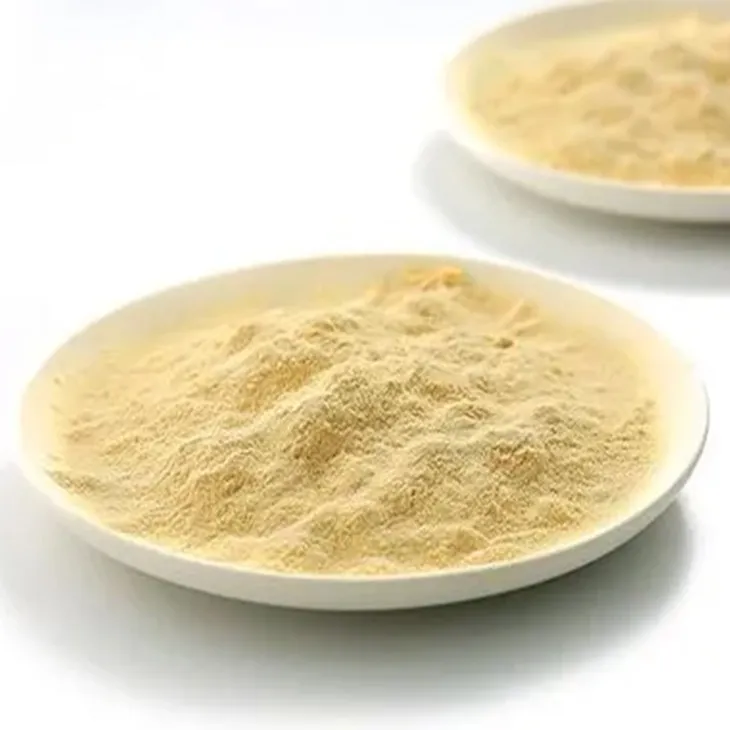- 0086-571-85302990
- sales@greenskybio.com
Selenium yeast: Benefits, uses and possible side effects.
2024-11-12

1. Introduction to Selenium yeast
Selenium is a crucial micronutrient that is required by the human body in small amounts for various physiological functions. Selenium yeast is a form in which selenium is presented and has gained popularity as a dietary supplement. It is produced by incorporating selenium into yeast during the fermentation process. This form of selenium is considered to be highly bioavailable, meaning that it can be easily absorbed and utilized by the body.

2. Benefits of Selenium yeast
2.1 Immune System Boost
The immune system is our body's defense mechanism against various pathogens such as bacteria, viruses, and fungi. Selenium yeast plays an important role in enhancing the immune system. Selenium is an essential component of selenoproteins, which are involved in immune cell function. For example, it helps in the proper functioning of lymphocytes, which are white blood cells that play a key role in the immune response. Studies have shown that selenium - deficient individuals may have a weakened immune system, and supplementation with selenium yeast can help to improve immune function.
2.2 Antioxidant Defense
Oxidative stress occurs when there is an imbalance between the production of free radicals and the body's ability to detoxify them. Free radicals are highly reactive molecules that can damage cells, proteins, and DNA. Selenium yeast acts as an antioxidant, helping to neutralize free radicals. Selenium is a component of the enzyme glutathione peroxidase, which is one of the body's main antioxidant defense systems. This enzyme helps to convert harmful hydrogen peroxide into water and oxygen, thereby protecting cells from oxidative damage. By reducing oxidative stress, selenium yeast may also have implications for preventing chronic diseases such as cancer, heart disease, and neurodegenerative disorders.
2.3 Thyroid Function
The thyroid gland is an important endocrine gland that regulates metabolism, growth, and development. Selenium is necessary for the proper functioning of the thyroid gland. It is involved in the synthesis and metabolism of thyroid hormones. Selenium - containing enzymes play a role in converting the inactive form of thyroid hormone (T4) to the active form (T3). Additionally, selenium helps to protect the thyroid gland from oxidative damage. Deficiency in selenium can lead to thyroid disorders such as hypothyroidism or goiter. Selenium yeast supplementation may be beneficial for individuals with thyroid problems or those at risk of developing thyroid disorders.

3. Uses of Selenium Yeast
3.1 Dietary Supplement
Many people choose to take selenium yeast as a dietary supplement. It is available in the form of tablets, capsules, or powders. Selenium yeast supplements are often used to ensure an adequate intake of selenium, especially for individuals who may not get enough selenium from their diet. This includes vegetarians and vegans, as plant - based foods may be lower in selenium compared to animal - based foods. Additionally, older adults, pregnant and lactating women, and individuals with certain medical conditions may also benefit from selenium yeast supplementation.
3.2 Animal Nutrition
Selenium yeast is also used in animal nutrition. It is added to animal feed to improve the health and productivity of livestock. In animals, selenium is important for immune function, reproduction, and growth. Selenium - deficient animals may be more susceptible to diseases, have reduced fertility, and slower growth rates. By supplementing animal feed with selenium yeast, farmers can help to ensure the well - being of their animals and improve the quality of animal - derived products such as meat, milk, and eggs.
4. Possible Side Effects of Selenium Yeast
4.1 Acute Toxicity
Although selenium is an essential nutrient, excessive intake can lead to toxicity. Acute selenium toxicity is rare but can occur if a very large amount of selenium yeast is consumed in a short period of time. Symptoms of acute selenium toxicity may include nausea, vomiting, diarrhea, abdominal pain, hair loss, and nail changes. In severe cases, it can lead to neurological problems, liver and kidney damage, and even death. However, such cases are extremely rare and usually occur due to accidental ingestion of very high - dose selenium products.
4.2 Chronic Toxicity
Chronic selenium overexposure is more likely to occur with long - term supplementation at high doses. Chronic toxicity may manifest as skin rashes, brittle nails, garlic - like breath odor, and fatigue. High - level selenium exposure over a long period may also increase the risk of developing diabetes and certain types of cancer. It is important to note that these risks are associated with excessive selenium intake, and the recommended daily intake of selenium should not be exceeded without medical supervision.
5. Considerations for Use
Before starting selenium yeast supplementation, it is important to consider several factors. Firstly, it is advisable to consult a healthcare professional, especially if you have any pre - existing medical conditions, are taking medications, or are pregnant or breastfeeding. Your doctor can help to determine whether selenium yeast supplementation is appropriate for you and can recommend the appropriate dosage. Secondly, it is important to follow the recommended dosage instructions on the supplement label. The recommended daily intake of selenium varies depending on age, sex, and life stage. In general, the adult recommended dietary allowance (RDA) for selenium in the United States is 55 micrograms per day for men and women. However, some individuals may require higher or lower amounts depending on their individual circumstances.
6. Conclusion
Selenium yeast is a valuable supplement with many potential benefits for human health, including boosting the immune system, providing antioxidant protection, and supporting thyroid function. It also has important uses in animal nutrition. However, like any supplement, it is not without potential side effects, especially when taken in excessive amounts. By understanding the benefits, uses, and possible side effects of selenium yeast, individuals can make informed decisions about whether or not to include it in their diet or supplementation regimen. It is always important to approach supplementation with caution and under the guidance of a healthcare professional.
FAQ:
What are the main benefits of selenium yeast?
Selenium yeast offers several benefits. It can enhance the immune system, which helps the body defend against various diseases. It also plays a significant role in antioxidant defense. Antioxidants protect cells from damage caused by free radicals. Moreover, it may have implications for thyroid function, which is important for regulating metabolism in the body.
How does selenium yeast boost the immune system?
Selenium is involved in the function of immune cells. It helps in the proper activation and regulation of these cells. Selenium yeast provides a source of selenium that can be utilized by the body to support the immune system. For example, it may enhance the production of cytokines, which are signaling molecules that play a role in immune responses.
What is the role of selenium yeast in antioxidant defense?
Selenium is an essential component of antioxidant enzymes such as glutathione peroxidase. These enzymes help to neutralize free radicals in the body. Selenium yeast provides selenium, which is incorporated into these enzymes, enabling them to function effectively in reducing oxidative stress and protecting cells from damage.
How might selenium yeast affect thyroid function?
Selenium is necessary for the proper function of thyroid hormones. It is involved in the conversion of thyroxine (T4) to the more active triiodothyronine (T3). Selenium yeast can supply selenium, which may support this conversion process and help maintain normal thyroid function.
What are the possible side effects of selenium yeast?
While selenium is an essential nutrient, excessive intake of selenium yeast can lead to side effects. High levels of selenium may cause symptoms such as hair loss, nail brittleness, and gastrointestinal problems like nausea, diarrhea, and abdominal pain. It is important to follow the recommended dosage to avoid these potential side effects.
Related literature
- The Role of Selenium in Health and Disease"
- "Selenium Yeast: A Comprehensive Review of Its Properties and Applications"
- "Beneficial Effects and Safety of Selenium Supplementation: A Review"
- ▶ Hesperidin
- ▶ citrus bioflavonoids
- ▶ plant extract
- ▶ lycopene
- ▶ Diosmin
- ▶ Grape seed extract
- ▶ Sea buckthorn Juice Powder
- ▶ Beetroot powder
- ▶ Hops Extract
- ▶ Artichoke Extract
- ▶ Reishi mushroom extract
- ▶ Astaxanthin
- ▶ Green Tea Extract
- ▶ Curcumin Extract
- ▶ Horse Chestnut Extract
- ▶ Other Problems
- ▶ Boswellia Serrata Extract
- ▶ Resveratrol Extract
- ▶ Marigold Extract
- ▶ Grape Leaf Extract
- ▶ blog3
-
High purity olive leaf extract
2024-11-12
-
Lavender oil extraction method
2024-11-12
-
100% organic virgin sea buckthorn fruit oil
2024-11-12
-
Lotus leaf extract powder factory in China
2024-11-12
-
China aged garlic extract supplier
2024-11-12
-
Deer antler extract powder manufacturer
2024-11-12
-
Saw palmetto extract vs whole herb
2024-11-12
-
Rosemary extract
2024-11-12
-
Sugarcane Extract
2024-11-12
-
Peppermint Extract Powder
2024-11-12
-
Cat Claw Extract
2024-11-12
-
American Ginseng Root Extract
2024-11-12
-
Kidney Bean Extract
2024-11-12
-
Hericium erinaceus extract powder
2024-11-12
-
Cassia Seed Extract
2024-11-12
-
Astaxanthin
2024-11-12
-
Maitake Mushroom Extract
2024-11-12





















